
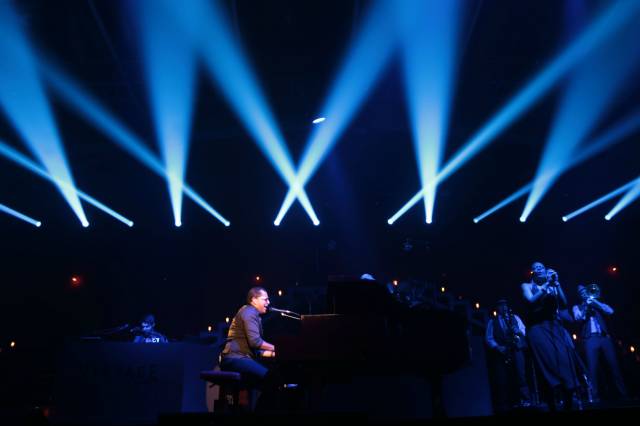
Gregory Charles was born to entertain. Before he turned ten, the pint-sized piano man was performing both at home in Canada and abroad; later, as a television and radio personality, he continued to promote his boundless love of music and talent for performing. His special knack and favorite pastime? Taking requests. From Liszt to Lady Gaga, nothing is too strange and nothing is too obscure. Now, at Le Qube, a pop-up theater on Manhattan's West Side, Charles and his talented band of musicians are tackling what may be their toughest audience yet: New Yorkers. For Charles' new request-based show, Vintage Live, attendees complete a "musical profile" ahead of time and then submit live requests via smartphone during the show. What results is a performance that aims to please everyone, no matter what their musical taste.
The maestro talked to StageBuddy about preparing for New York audiences, borrowing from some old fashioned traditions, and what it means to be a real musician.
Could you talk a little bit about your background in improvisation? Have you engaged in any projects like this before?
I owe this to my parents. I come from a musical family. My mom was a concert pianist and my dad is part of an entire family who plays -- they all play steel drum. My dad is from Trinidad and my mom is French Canadian. And on my mom's side her brother is a bass player and her sister is an opera singer, and everyone is a musician. So when I was a kid, I started playing classical piano. My parents were party people, they loved to entertain; every Friday and Saturday night we'd have people over, and my mom knew the best way to become good at what you do music-wise is to play for people, so she would tell our guests, our son is going to play 15 minutes, he's going to bore you to death, he's going to play some Scarlatti or some Mozart, but then after that he's going to take your requests. Friday and Saturday would be us at home, Thursday we'd go to an elderly home and my mom would have me sit there and she would ask people, elderly people, what their song was, and then she'd turn to me and say, "Okay, you can play that," and that's how I learned a lot of repertoire. I did that my entire childhood.
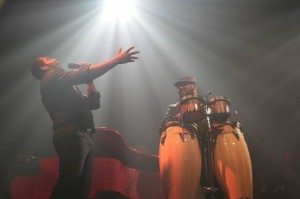
I played in orchestras in Europe and a bunch of competitions, but the most fun was the parties. I was always the party guy. I was always the guy who would sit at the piano and play classical music or jazz or pop music and just take requests. So eventually, as I'm sure you'll understand, my first job was as a piano man. My first job was in a shopping mall doing piano bar stuff. And then when I went to college -- I'm a lawyer, I studied law -- every night I would play. And so that went on and went on and once I finished my law degree I went into television for different reasons, and I became a television host. One of my first gigs on television was as a host of a late night talk show, a bit like David Letterman, but a obviously in a smaller setting, 'cause it was in French Canada. Every night I would end the show by saying, "Okay we'll take a commercial break" -- it was a live show -- "Call us, tell us what you want to hear and we'll do it." So I actually started doing that on TV before I did it on stage. People would call in and request songs and we'd do them live. And the comments we got were fantastic, but people thought it was a gimmick, because people thought TV was never spontaneous.
After that show ended, I left on tour with Celine Dion for a year. She came back and got married and decided to stay in Vegas and I wasn't interested in that part. So I came back and decided that I wanted my own show. I had just toured the world with Celine, seeing 90,000 people in Japan and 75,000 people in Hong Kong. And I thought, man that's great, if I can even get 1% of that that's fantastic. When I started thinking about what kind of show I should do, the first thing that came to my mind was, I should do a request show. My first show, called Black and White, was a show where people came in and filled out song requests, and we'd pick them at random and we'd do them. We started in a 300 seat room and then a few weeks later it was a 2,000 seat room, and then soon after it had become the Bell Center in Montreal where we'd have 16,000 every night. It became a big, big, big hit, so we did that for many years, but it was difficult to transpose that into another setting, because I had a history with people in Canada. I had been on television, I had been on radio, so people knew the story. We came here to New York in 2004 to the Beacon, and that went well. We went back to Canada, we were doing a million things. Then the technology evolved, and I thought, we should bring this up a notch, we should add smartphones and we should add this ability for people to tell us what they want to hear and fill out a musical profile. And that turned into what we do now. I knew I wanted to come back to New York and give it a try. And then came the idea of mobile venues and theaters and web matrix and the whole thing, and one thing led to another, and here we are for a month. Hopefully we can open a window that allows us to stay here and stay here for much longer.
The idea of a "piano man" is a fairly old-fashioned one, yet you've managed to marry it with new technology and a new generation. Will the show continue to evolve?
The reason I called the show "vintage," is usually when [people] request a song, it's because to them it's vintage, whether it's a week old or one hundred years old. But the methodology of the show is also vintage. As you said, and I think you're completely correct, the idea of the piano man is a very vintage one, I mean Franz Liszt would do this in the 19th century. He would go onstage and bring his composition and play that, then he would take requests. The audience would say, "Play Beethoven's Seventh Symphony," and he would sit down, and he would reorchestrate Beethoven's Seventh Symphony on the piano.
The other thing that uses an old idea, is the way I communicate with the musicians. The language that we use is the way they communicated in big bands in the '40s. Big bands were the DJs of the '40s and '50s. A DJ doesn't want to stop playing, because if you stop playing they stop dancing, and if they stop dancing they're not as thirsty, and if they're not thirsty they're not buying as much booze. So [in the '40s and '50s] the bands would keep on playing and the way band leaders would communicate with the band was sign language, telling them what key the next song was in and what the rhythm for the next song will be. I learned that language from my dad, who had no formal training, but he knows that language, and I taught it to the musicians who play with me. I would say 75% of the time my musicians have no idea what the songs we're playing are. But they follow the language and they can still play.
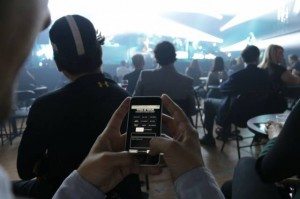 Now the third old idea is trying to figure out what your audience is like as a whole. In the early 20th century, orchestras would have a membership, and that membership was required to fill out a musical profile, so actually what they played for the membership, they knew that the membership would enjoy it. So in a way, when we have people fill out the musical profile, we get a snapshot of that audience. Is it more '80s, '90s, '60s, 2000s? Is it more Michael Jackson or Beyoncé? Is it more Coldplay or Rolling Stones and Queen? So that snapshot allows us to combine within the show the audience as a whole, but also individual requests coming from individual people. So in that sense I believe that our show is unique but also I believe that our show will never be old, because it will always be representative of the people sitting -- or dancing -- in the venue.
Now the third old idea is trying to figure out what your audience is like as a whole. In the early 20th century, orchestras would have a membership, and that membership was required to fill out a musical profile, so actually what they played for the membership, they knew that the membership would enjoy it. So in a way, when we have people fill out the musical profile, we get a snapshot of that audience. Is it more '80s, '90s, '60s, 2000s? Is it more Michael Jackson or Beyoncé? Is it more Coldplay or Rolling Stones and Queen? So that snapshot allows us to combine within the show the audience as a whole, but also individual requests coming from individual people. So in that sense I believe that our show is unique but also I believe that our show will never be old, because it will always be representative of the people sitting -- or dancing -- in the venue.
Do you find that from one night to the next the show differs widely as far as the requests you'll get?
What people request is very different based on what market you're in. To prepare for shows, no matter which market we're in, I listen to radio. I listen to radio for six months. We did the show for a couple of months in Scotland a year ago, and what I did was I listened to Scottish radio for five months. And by radio I mean all of the radio stations. I did the same thing starting last year in July for this month's stint in New York. Because New York has middle of the road stations, it has hip-hop stations, it has classic rock stations, they also have the new country station. And usually, even though radio doesn't have the same power it once has, usually a market still resembles its radio stations. Why? Because radio stations cater to that market because they want them to listen. So if you know any given 500 songs a month on the classic rock stations and the 400 or 500 songs from the pop station, and if you pay attention to hip hop, and if you pay attention to everything that's recent -- Rihanna, Meghan Trainor, Taylor Swift, Ariana Grande -- plus, if you can pay attention to what goes on on college stations, which I do a lot, then you have a pretty good idea of what 75% of an audience in a given market likes. Then the other 25% is comprised of old fashioned people who love (in the case of New York) Broadway show tunes, who love the standards from the '40s and '50s and '60s, who are in a way very proud of the New York scene, so they'll be proud of the Billy Joel and Barbra Streisand. Our first request on the first night was Andrew W.K. Which is...a big star in New York. So that 25% is comprised of people who are proud, who have fringe taste, might like opera, might like classical music, who like standards. And crazy people. Who love Zappa, but not the common Zappa. They love Mandrake, they love Rhapsody. You know, they love stuff that is absolutely not mainstream. The reason why we're pretty good at what we do is because I'm rigorous about that 75% and I'm pretty geeky about the rest.
Sunday we got a request from a pretty nice gentleman who wanted Band of Heathens. He wanted a song called "Cornbread" by Band of Heathens. Well, it just so happens that I'm geeky enough to listen to recent groups out of Texas playing folk/country music. I'm geeky enough for that.
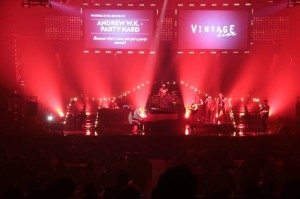
So you want to make that 25% just as happy as the 75%?
I do! I do, and the thing that's funny is, sometimes when people do come to stump us, they'll think, okay, what's the craziest thing I can ask? And they'll go into opera. It just so happens that I'm a big opera aficionado, I just love opera and I love choral music and I love classical music, so that's not a place where they can get me. And jazz music is something that all of my musicians and I studied in school and love as well, and we also come from a place where a jazz festival is the biggest event that we have. But we have been stumped, it's not that we can't be stumped. Obviously we know enough music that we know there's way more music out there that we don't know than music that we do know. Plus the good thing is that most people do not come to stump us. They come to hear music that they like and want to enjoy.
Is there anything that people don't request that you wish they would request, or something that when people request you find yourself getting really excited about?
First of all, I love music. I was on a plane when I was 11 years old, I was going to a competition... I haven't told this story very much. I was a classical pianist then, I was going to a competition in Europe. I was sitting next to a man who said "Hey, you're young, you're traveling by yourself, where are you going? What are you doing?" I told him, "I'm representing Canada in an international competition," blah blah blah, he said, "So what are you?" I said, "I'm a musician." He said, "Okay, what do you like?" And I said, "I like Rachmaninov, and I like Chopin, and I like Liszt, and I like Beethoven." And then he started naming other composers and I said, "Nah, not so much," and he said, "Do you like jazz?" And I said, "Nah, not so much." He said, "What about jazz, what about pop music," then he named groups and other things, progressive rock, and I said "Nah, not so much." And he said, "Well, you're not a musician then, you're just a guy who likes six composers." And I was deeply insulted. But then it stuck with me, and through the years I got that what he meant was, if you're musician, you should love music.
From that point on, eleven years on, I started listening to absolutely everything. So is there stuff that I like more than other things? Yeah. But I really enjoy all of music. In a sports comparison, I'm not just a Montreal Canadiens fan, I'm a hockey fan. By the same token, I love music as a whole. More precisely to your question, I love when people are crazy enough to request songs that are like twelve minute long, you know, progressive rock stuff, stuff by Meatloaf, you know, "Scenes From an Italian Restaurant," the original "MacArthur Park" by Jimmy Webb. "Life on Mars" by David Bowie. I love it when people request that stuff that's like 15 minutes long and think, they're never gonna do it. Because I love that stuff, I love that platform of operatic pop music that goes on forever. I love people whose request is an opera. Not an opera aria, an opera. I love when people want to hear The Dark Side of the Moon, because then it allows me, the geek, to say, okay, let's do parts of ALL of Dark Side of the Moon. I love that. I mean our show can't be completely comprised of stuff like that, but I do love it when people are insane enough when they come and ask something thinking there's NO way they can do it.
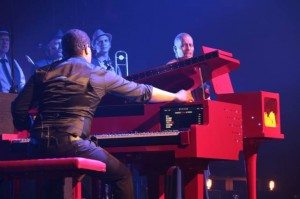 Sometimes people refrain from asking things because they're being polite or they're being nice, but they don't know that sometimes things that they don't think are difficult actually are. I'll give you an example: "Unforgettable." It's a crazy song. Hip hop as a whole is a very difficult genre. It's impossible to come up with samples in a fraction of a second -- although our keyboardist sometimes does. But we always welcome the challenge.
Sometimes people refrain from asking things because they're being polite or they're being nice, but they don't know that sometimes things that they don't think are difficult actually are. I'll give you an example: "Unforgettable." It's a crazy song. Hip hop as a whole is a very difficult genre. It's impossible to come up with samples in a fraction of a second -- although our keyboardist sometimes does. But we always welcome the challenge.
Is there anything that you would like the tell our readers, maybe someone who is considering going to the show or doesn't quite know what you do?
I would say one thing. Even though we are musical geeks, even though we are like encyclopedias of music, and even though there's a web matrix and there's technical stuff and people use their smartphones, etc., this is a very simple show. It's about people who love music, who want to get up and dance, who want to have a good time. That's just what it is. It's an interactive, real time, musical revue, and the one thing that makes me happiest is not people who leave thinking, "they were so brilliant, they know a lot of music" or "hey were so creative and inventive" because we make it up spontaneously. The thing that I love hearing is when people leave saying that they had the time of their lives. That they had the best time ever. That's the only important thing. And it doesn't matter how old you are. Whether you're 77 or 7, your interest in music, your favorite song, your request is just as important to us.
Gregory Charles performs "Vintage Live" at Le Qube through May 2.